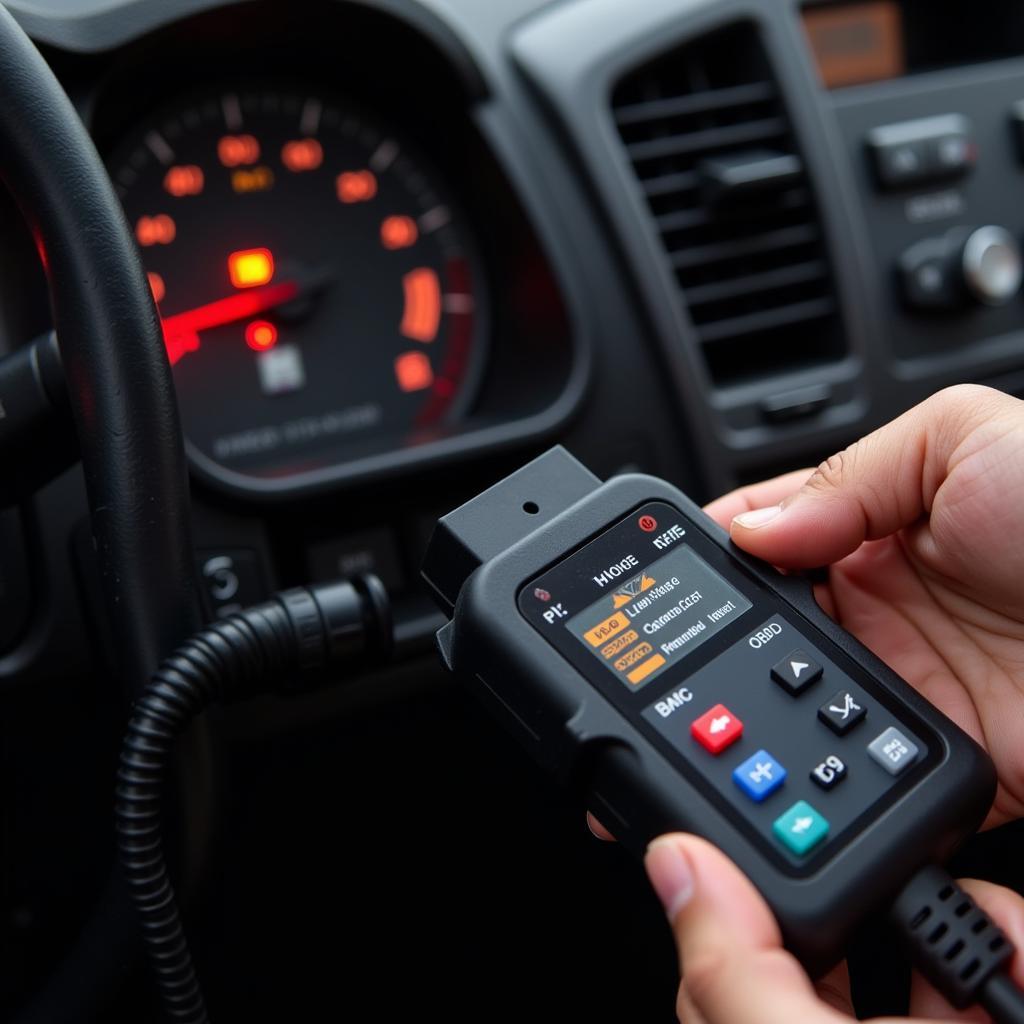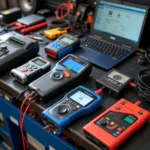When your car starts acting up, getting a quick and accurate diagnosis is crucial. Whether it’s an enigmatic check engine light or a more obvious performance issue, “car diagnostics near me” is a search term many of us turn to in times of automotive trouble. But with so many options available, finding a reliable mechanic who won’t break the bank can feel overwhelming. This article is your guide to navigating the world of car diagnostics, ensuring you make an informed decision and get back on the road with confidence.
Understanding Car Diagnostics: More Than Just a Code Reader
While many associate car diagnostics with simply plugging in a code reader, it’s a much more comprehensive process. Modern vehicles are equipped with complex computer systems known as Electronic Control Units (ECUs) that monitor various aspects of your car’s performance. When a problem arises, the ECU stores a Diagnostic Trouble Code (DTC) that provides clues about the issue.
Skilled technicians use advanced diagnostic tools that go beyond basic code reading. These tools allow them to:
- Retrieve and interpret DTCs: Understanding what each code means and its potential causes.
- Analyze live data streams: Monitor real-time sensor readings to identify intermittent issues or confirm suspected problems.
- Conduct component activations: Test individual components like actuators, solenoids, and relays to pinpoint the faulty part.
- Access technical service bulletins (TSBs): Consult manufacturer documentation for known issues and recommended repair procedures specific to your vehicle make and model.
Choosing the Right “Car Diagnostics Near Me”
Finding a trustworthy mechanic is paramount when it comes to car diagnostics. Here’s what to consider:
- Reputation: Look for reviews and ratings from previous customers. Online platforms and local forums can provide valuable insights into the experiences others have had.
- Expertise: Ensure the mechanic specializes in car diagnostics and has experience working on your vehicle’s make and model. Some shops specialize in specific brands or types of vehicles.
- Equipment: Modern vehicles require sophisticated diagnostic equipment. Choose a shop that invests in up-to-date tools and technology.
- Transparency: A reputable mechanic will clearly explain the diagnostic process, the findings, and the recommended repairs. They should be open to answering your questions and addressing your concerns.
- Cost: Get a clear understanding of their diagnostic fees upfront. Some shops offer free or discounted diagnostics with repairs.
Beyond the Repair Shop: Car Diagnostics Near Me – Mobile Options
In today’s fast-paced world, convenience is key. Car diagnostics near me mobile services have gained popularity, offering on-location diagnostics and even minor repairs. This can be a time-saving option if you’re unable to take your car to a shop.
When considering mobile diagnostics, ensure the technician is ASE-certified and carries the necessary insurance. It’s crucial to prioritize safety and reliability even when opting for a mobile service.
Common Car Problems Detectable with Diagnostics
Car diagnostics can pinpoint a wide range of issues, from minor glitches to major malfunctions. Some frequently encountered problems include:
- Check Engine Light: This ubiquitous warning light can indicate anything from a loose gas cap to a more serious engine problem.
- Transmission Problems: Slipping gears, rough shifting, or a complete transmission failure often require professional diagnostics.
- ABS and Traction Control Issues: Faulty sensors or system malfunctions can compromise your vehicle’s safety features.
- Electrical Problems: From malfunctioning lights to complete electrical system failures, diagnostics can help pinpoint the source of the problem.
- Airbag System Faults: A malfunctioning airbag system is a serious safety concern that requires immediate attention.
Don’t Ignore the Warning Signs
Ignoring warning lights or unusual noises coming from your vehicle can lead to more extensive and costly repairs down the line. Addressing car problems promptly is essential for both your safety and the longevity of your vehicle.
Conclusion: Car Diagnostics – Your Path to a Healthier Car
Finding reliable “car diagnostics near me” doesn’t have to be a daunting task. By understanding the process, choosing the right mechanic, and addressing issues promptly, you can keep your car running smoothly for years to come. Remember, regular maintenance and timely diagnostics are investments in your vehicle’s health and your peace of mind.
FAQs about Car Diagnostics
1. How often should I get my car’s diagnostics checked?
It’s generally recommended to have your car’s diagnostics checked annually or whenever you experience unusual performance issues or warning lights.
2. Can I do car diagnostics myself?
While basic code readers are available for personal use, they may not provide comprehensive information. It’s best to consult a qualified mechanic for accurate diagnostics and repair recommendations.
3. How much do car diagnostics cost?
Diagnostic fees vary depending on the shop and the complexity of the issue. On average, you can expect to pay between $50 to $150 for a diagnostic test.
4. What is the difference between OBD-I and OBD-II?
OBD stands for On-Board Diagnostics. OBD-I was an early system with limited diagnostic capabilities. OBD-II, introduced in 1996, is a standardized system that provides more comprehensive diagnostic information.
5. Can car diagnostics detect problems with my tires?
While car diagnostics can detect issues with the Tire Pressure Monitoring System (TPMS), they don’t directly assess tire wear, alignment, or other tire-related problems.
6. What if the check engine light is flashing?
A flashing check engine light usually indicates a more serious problem that requires immediate attention. It’s crucial to get your car diagnosed and repaired as soon as possible to prevent further damage.
7. Can car diagnostics tell me if I need an oil change?
Car diagnostics won’t directly tell you if you need an oil change. Refer to your owner’s manual for recommended oil change intervals based on mileage or time.
Need Help Finding Reliable Car Diagnostics Near You?
For expert assistance with all your car diagnostic needs, contact us via WhatsApp: +1(641)206-8880 or Email: [email protected]. Our dedicated team is available 24/7 to answer your questions and provide reliable solutions.


